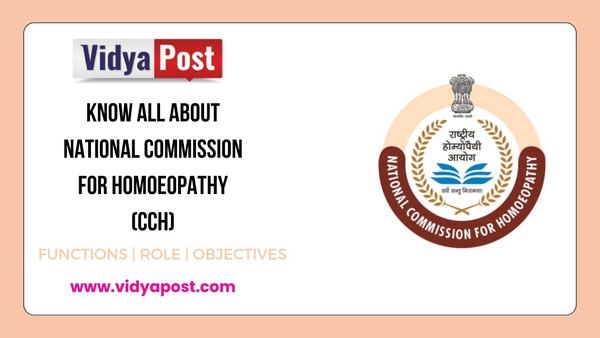Know All about National Commission for Homoeopathy (CCH) - Functions Role Objectives

The National Commission for Homoeopathy (formerly known as the Central Council of Homoeopathy) is a statutory body of the Government of India's Ministry of AYUSH. The Central Council of Homoeopathy was founded by the Indian government in 1973.
The Homoeopathy Central Council Act, of 1973 was abolished and the Central Council of Homoeopathy was replaced on July 5, 2021, the same day the National Commission for Homoeopathy was established. It is a member of the University Grants Commission's (UGC) Professional Councils, which were established to oversee higher education in India.
Also, Read All about BCI- Bar Council of India
HISTORY
The Central Council of Homeopathy Act of 1973 established the institution (Act 59). Every university or comparable organisation in India that wants to grant a degree or a diploma in homoeopathy must first receive CCH approval and then be included on the schedules of the aforementioned statute.
In addition to maintaining a central register of all homoeopathic doctors in India, the CCH also specifies specific course content and announces benchmarks that need to be followed by homoeopathy teaching institutes.
The "National Council for Clinical Establishments" was established by the Union Health Ministry in 2007 to "define basic requirements" for clinical establishments. This National Council also formally includes a representative from CCH.
The CCH's director, Ramjee Singh, and another man were detained by the Central Bureau of Investigation (CBI) in October 2016 in connection with the alleged collection of money to produce a favourable report that would enable regulatory approval. Source
ROLE OF CCH
-
Enhancing everyone's ability to get basic healthcare services.
-
Enhancing child and maternal health.
-
Ensuring that the population growth rate is slowed to achieve population stabilisation.
-
Creating healthy resources to achieve health objectives.
-
Lessening society's overall disease burden.
-
Stabilizing the secondary and tertiary health care systems.
FUNCTIONS OF CCH
-
To improve AYUSH hospitals and dispensaries and co-locate AYUSH facilities in primary health centres (PHCs), community health centres (CHCs), and district hospitals to provide accessible, cheap AYUSH services to everyone (DHs).
-
To create a comprehensive wellness paradigm based on AYUSH concepts and practises to empower the masses for "self-care" to reduce illness burden, and out-of-pocket costs, and to provide the underprivileged public with a voice in their healthcare decisions.
-
To improve AYUSH educational institutions, State Government AYUSH Pharmacies, Drug Testing Labs, and the AYUSH enforcement system to increase institutional capacity at the state level.
-
Promote the development of medicinal plants by using Good Agricultural Practices (GAPs) to provide a steady supply of high-quality raw materials and to assist the certification process for high standards of quality.
-
Facilitate the creation of clusters through the integration of production, storage, value addition, and marketing, as well as the creation of an entrepreneur-friendly infrastructure. Source
THE MISSION
1. Providing fair, affordable, and accessible access to high-quality healthcare across all communities and regions, with a special emphasis on underserved populations and marginalised groups.
2. Creating a thorough primary healthcare delivery system and effective connections with secondary and tertiary care healthcare systems.
3. Lowering the rate of infant mortality
4. Determining a plan to lessen the burden of non-communicable diseases and lower the incidence of communicable diseases.
5. Concentrating on the nation's population stabilisation.
6. Expanding the capacity for training to provide medical, paramedical, and managerial human resources for health with the right mix of skills at all levels.
7. Controlling the provision of healthcare services and encouraging the prudent use of medicines in the nation.
CONCLUSION
On March 2, 2019, the Homoeopathy Central Council (Amendment) Ordinance, 2019 was enacted. It modifies the Homoeopathy Central Council Act of 1973, which established the Homoeopathic Central Council. Homoeopathic education and practice are governed by the Central Council. In 2018, a provision for the Central Council's supersession was added to the 1973 Act.
The Central Council was required to be reconstituted within one year of its dissolution. In the interim, the central government established a Board of Governors to exercise the Central Council's powers. The Ordinance amends the Act to increase the period for Central Council supersession from one year to two years.
Also, Read All about INC
Share:

2 Comments
Jordan Singer
2d2 replies
Santiago Roberts
4d